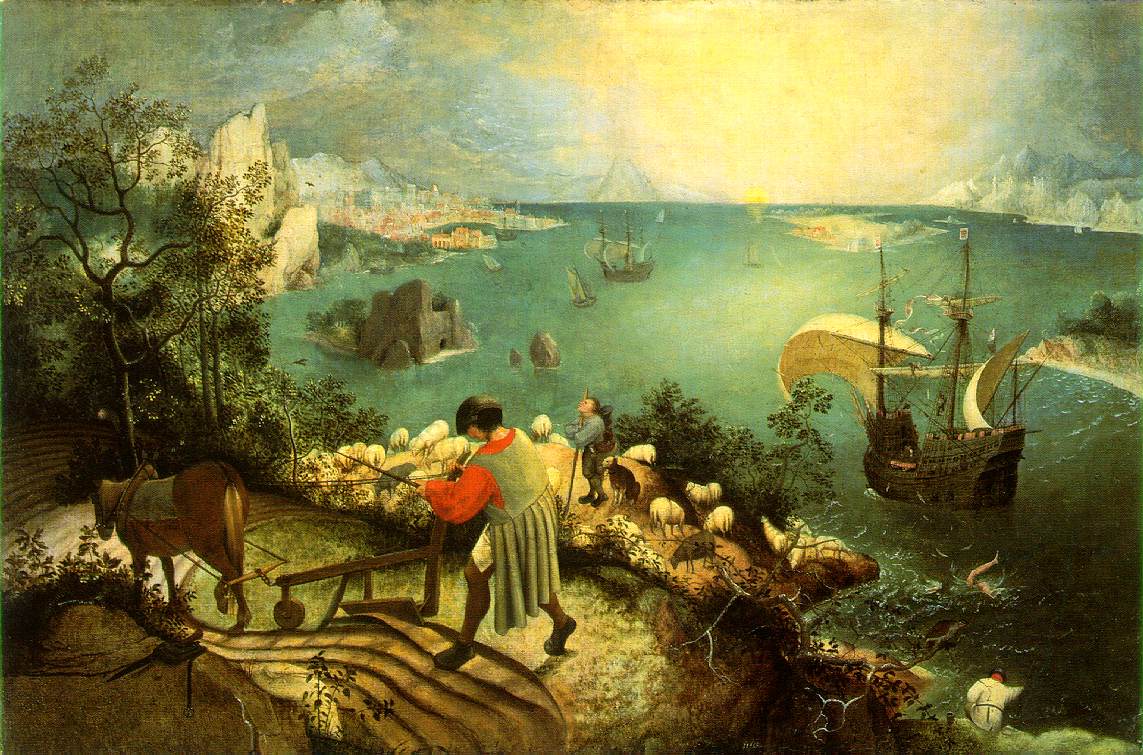
What I'm going to suggest first here is probably a horrible thing to do to a perfectly lovely poem, on the one hand; but, on the other, it is, perhaps, a way of explicating it and, at the same time, illustrating how we use punctuation to make meaning. William Carlos Williams, a 20th Century American poet (and physician) wrote a moving and descriptive poem that captures the essentially existential message embodied in the painting "Landscape with the Fall of Icarus," a work completed circa 1558 by the Dutch painter Pieter Bruegel the Elder (1525?-1569).
Williams punctuates the poem only by use of a few capital letters, an apostrophe to indicate possession, and by the arrangement of the lines. However, formatted and punctuated differently, the poem could be used as a descriptive caption under a reprint of the painting in an art history book. And that's what I'd like you and a couple partners to do.
First, it would help to know something about the Icarus myth, so read a short version of the story about Daedalus and his son Icarus by following link to the Greek Myths & Greek Mythology, and read a somewhat more in-depth version of the story of Daedalus and Icarus at Myth Man's Greek Mythology Today web site. Like most versions of Greek myths we read today, these vary slightly. Give some thought to why that is the case because we will discuss that topic briefly in class.
After you are familiar with the myth, come back to this page and study Bruegel's painting below; contemplate what the painting says about the nature of myths in the everyday world.
On a "Microsoft Word" document with your name or names at the top, answer these three questions:
Paragraph 1, a summary: What did Icarus do? Write a paragraph which summarizes the myth as if you are telling it to someone who does not know it.
Paragraph 2, critical interpretation:
Task 3, reformatting and editing: Finally, highlight the text of the poem to copy it (right click your mouse button); then
paste the poem into an M.S. Word document. Without rewording it in any way, refomat
the poem into grammatically complete prose sentences and punctuate them correctly so that it describes
the painting and conveys its meaning as would a description of the painting in an art history book. Double space the whole document.

"Landscape with the Fall of Icarus"
by William Carlos Williams
According to Brueghel
when Icarus fell
it was spring
a farmer was ploughing
his field
the whole pageantry
of the year was
awake tingling
near
the edge of the sea
concerned
with itself
sweating in the sun
that melted
the wings' wax
unsignificantly
off the coast
there was
a splash quite unnoticed
this was
Icarus drowning
Read some other wonderful poems about the painting by Bruegel or about the Icarus myth
Essay writing prompts based on the myth and the painting.
Return to Mr. D's home page